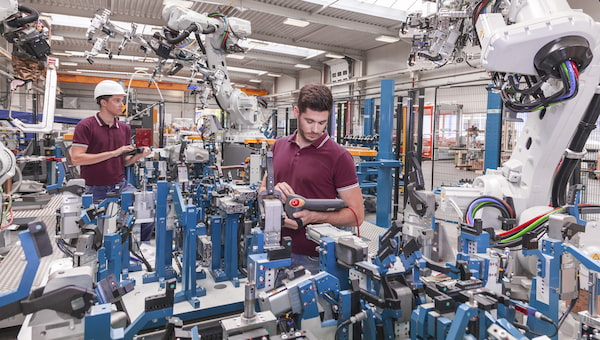News and Events
The robotics industry is constantly changing and evolving. New robotics technologies and developments in automation are quickly creating exciting career opportunities at every education level – from micro-credentials to PhDs. Here is where you can learn more about robotics careers in manufacturing and how these new technologies are benefiting workers


NEWS
Essential Skills Required for Robotics Integrator Jobs
August 17, 2023The role of robotics integrator has emerged as a cornerstone of Industry 4.0, a term that encapsulates the ongoing industrial revolution powered by automation and advanced robotics.
Robotics integrators are the masterminds behind the manufacturing floor, crafting systems of robots tailored to the unique needs of manufacturers. Robotics integrator skills are rooted in a deep understanding of the complexities of robotics and automation, knowledge they leverage to optimize manufacturing processes.
The Role of a Robotics Integrator
A robotics integrator is like a grand planner in the world of manufacturing. Their primary task is to design a system of robots that aligns with the specific needs of a manufacturer. The skills needed by a robotics integrator include examining the current setup on the manufacturing floor, pinpointing areas that could benefit from improvement, and designing a system that addresses these needs.
But the role of a robotics integrator goes beyond just design. The skills needed by a robotics integrator also include soft skills like communication and collaboration. They are often called to act as liaisons, working with manufacturers and suppliers to secure the necessary components for their designs. This makes the role of a robotics integrator crucial in bridging the gap between manufacturers and robotics suppliers, ensuring that the final system is a perfect fit for the manufacturing process.
As more businesses adopt automation, the role of robotics integrators within manufacturing companies is set to expand. They are the ones who bring automation and robotics to the production floors, enhancing efficiency and productivity.
Skills Needed by a Robotics Integrator
A robotics integrator needs a diverse skill set to effectively design and implement robotic systems. First and foremost, they need a deep understanding of various robots and automation systems. This knowledge is crucial for integrating different types of robots into a cohesive system.
Another key robotics integrator skill is data analysis. They need to understand initial process metrics and use this understanding to improve these metrics, thereby enhancing the efficiency of the manufacturing process.
Beyond these technical skills, a robotics integrator also needs effective communication skills. They must be able to convey complex technical concepts to non-experts, such as manufacturers who may not have a background in robotics. Strong problem-solving abilities are also an essential robotics integrator skill for addressing challenges that may arise during the design and implementation of robotic systems.
Educational Requirements for Becoming a Robotics Integrator
The journey to becoming a robotics integrator typically involves post-secondary education. The abilities, knowledge, and skills needed for a robotics integrator role are often found at the college level. While there's no strict rule that an integrator must have a college degree, pursuing one in robotics, engineering, or a related field is highly recommended.
In addition to a degree, robotics certifications, engineering, or system design can significantly enhance one's credentials. These certifications are often available upon course completion for those who take college courses without obtaining a degree.
Given the rapidly evolving nature of robotics technology and programming, continuous learning is essential for a robotics integrator. Staying abreast of advancements in the field ensures that a robotics integrator is always equipped with the latest knowledge and skills, ready to meet the demands of this dynamic and exciting career.
The Future of Robotics Integrators
The role of robotics integrators is not static; it evolves alongside technological advancements and shifts in the manufacturing landscape. As automation and machine learning continue to advance, robotics integrators may find themselves working more with data, using it to inform decisions about system improvements and efficiencies.
There is also an increasing focus on sustainability in manufacturing. Robotics integrators are likely to play a crucial role in designing and implementing environmentally friendly manufacturing processes. They will be at the forefront of creating systems that not only boost productivity but also minimize environmental impact, aligning with the growing emphasis on sustainable practices.
Preparing for a Career as a Robotics Integrator
For those who are interested in this dynamic field, the role of a robotics integrator offers a wealth of opportunities. Their expertise in designing and implementing robotics for manufacturing paves the way for enhanced productivity, efficiency, and innovation in various industries.
Resources like RoboticsCareer.org can be invaluable for those looking to explore training programs and courses to develop the skills needed for a successful career as a robotics integrator. Whether you are just starting or looking to further advance your skills, such platforms offer a wide range of resources vetted by industry robotics experts.
Create a profile today to start your journey towards becoming a robotics integrator.


